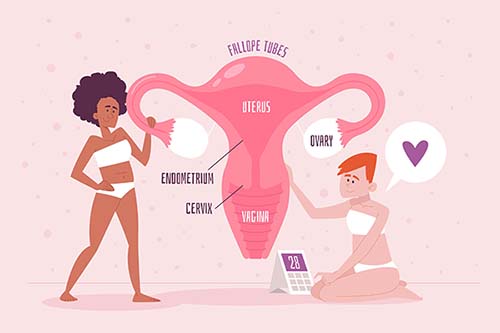Women's Health Services:
Gynecology & Obstetrics
Women's health should be taken seriously, and at Variety Care we make it easy for women to get the care they need. Annual health check-ups, women's health screenings and consultations with professionals about women's health concerns are just a few of the services we offer. This means that you can be confident that your health is in good hands. We are here to help with a full range of women's health services, from annual exams to specialty care, including obstetrics, pregnancy care and newborn care.
If you're looking for compassionate, professional care for women, Variety Care is the place for you.

GENERAL CARE
We offer comprehensive care for women of all ages, from puberty through menopause and everything in between. We will provide you with personalized support so your needs are met without compromising on quality or compassion. Receive the support you need to feel confident and in control of your health.
Have peace of mind when it comes to your health.

PREGNANCY CARE
When you are pregnant, it is important to have access to quality prenatal care. This includes both routine checkups as well as education and resources to help you manage your pregnancy. Our OBGYN providers are specially trained in women's health and will work with you to ensure that you have a healthy pregnancy.
We offer no-cost pregnancy tests, prenatal care, and support labor and delivery.

POSTPARTUM CARE
After giving birth, the female body goes through many changes. Women who have recently given birth should visit with an OBGYN to ensure they are healing properly and taking the necessary precautions to protect their health. We also provide helpful WIC services for women and children and preventative care for women that had gestational diabetes.
Health is our top priority. Receive guidance on post-partum care and resources to assist you and your baby.
What is an obstetrician-gynecologist (OBGYN)?
An obstetrician-gynecologist (OBGYN) is a doctor that specializes in female reproductive health and wellness. Gynecologists focus majority of their practice on women's reproductive organs, which include the ovaries, uterus, vagina, cervix, fallopian tubes
and breasts. Other areas of expertise are urinary tract infections, fertility and pregnancy.
Women who are experiencing issues with their reproductive system should see a gynecologist for help rather than seeing a general doctor or other specialist. This includes experiences of any abnormality in menstrual cycle, such as irregular bleeding.
Obstetrics is the branch of medicine that deals with pregnancy, childbirth and postpartum care. This area of medicine starts as soon as the female becomes pregnant up until one year after delivery, or post-partum. We also provide services for pregnancy and newborn care.
Our caring women’s health team provides a full line of affordable, quality obstetrical and gynecological care.
Services include:
- care for adolescents and adults
- well-woman annual exams
- managing menopause
- evaluation of irregular bleeding
- pap smears
- breast health / breast cancer screening
- bone health & osteoporosis
- family planning services
- birth control
- evaluation of infertility
- no-cost walk-in pregnancy testing at all locations
- pregnancy care / newborn care
- STD screening and treatment
- Ultrasounds
- postpartum care
PAP Smear VS. Pelvic Exam: What’s the Difference?
So, what is the difference between a PAP Smear and a Pelvic Exam? Both exams help women maintain a healthy reproductive system, but there are some key differences between the two.
PAP Smear
Why is it important?
Pap smears are one of the many women's health services. This screening helps detect pre-cancers and cell changes on the cervix, the narrow outer end of the uterus, that could cause cancer if not treated properly. The good news – cervical problems are easily preventable with regular pap smears combined with vaccinations for human papillomavirus (HPV). Early detection through routine exams plus the HPV vaccine will give you an edge in protecting yourself from developing any serious illnesses or disabilities caused by cancer or another virus!
What should I expect?

During a routine pap smear, the provider will begin by having you lay back and place each foot on a rest. Then the provider will gently insert a speculum into the vagina. A speculum is a tool used to hold the vaginal walls open. At this time, it is common to feel a bit of pressure. The provider will quickly insert and brush over the cervix with a long thin swab. This is done to collect a cell sample.
Now the hardest part is over! Your provider will remove the speculum and the cell samples will be sent to a lab for further testing.
How often do I need it?
Women should begin regular pap smear exams at the age of 21. If the pap smear results come back as normal, the exam only needs to be repeated every three years. Pap smears usually continue throughout a woman’s life to age 65 unless they have had a hysterectomy. Women who have had a hysterectomy do not need to continue receiving pap smears.
To schedule a pap smear exam, call 405-632-6688.
Pelvic Exam
Why is it important?
Pelvic exams look for ovarian cysts (sacs of fluid attached to the ovary where eggs are made), sexually transmitted infections (STIs), fibroids (non-cancerous growths on the uterus), and early-stage cancers. This exam allows for early detection of infections and provides you with a better understanding of your body and your reproductive health.
What should I expect?

During a pelvic exam, you will first lay back and put each foot on a resting place. The provider starts with a visual, external examination of the vulva (external parts of the genitalia) for anything out of the ordinary before starting an internal examination that allows them to see inside your vagina using a speculum. Lastly, the provider will move on to a physical exam. At this time, they will remove the speculum and insert two gloved fingers into the vagina while simultaneously pressing on your lower abdomen with their other hand. This allows your provider to feel your uterus and ovaries. Then you are all done!
How often do I need it?
While providers typically do yearly pelvic exams, it is optional so talk to your primary care provider or learn more about women's health services to see what best fits you. Your provider may recommend a pelvic exam if you are experiencing any symptoms such as unusual vaginal bleeding or discharge, pelvic pain or urinary problems.
The importance of pelvic exams and pap smears cannot be overstated. Whether you are sexually active or not, these exams are necessary to protect your body from potentially life-threatening diseases.
To schedule a pelvic exam, call 405-632-6688.

